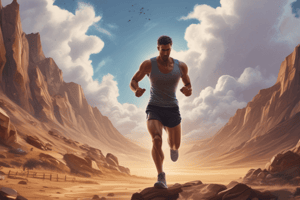Podcast
Questions and Answers
What is sports psychology?
What is sports psychology?
The study of the psychological factors that come into play before, during, and after sport performance situations and the application of that knowledge.
What is applied sport psychology?
What is applied sport psychology?
Concerned primarily with how theoretical concepts can be used in real-world settings to enhance performance and well-being of athletes.
What is exercise psychology?
What is exercise psychology?
Focuses on the general population and their exercise behaviors.
Who is known as the father of sport psychology?
Who is known as the father of sport psychology?
What year was the first graduate program in sport psychology established?
What year was the first graduate program in sport psychology established?
What are the main goals of applied sport psychology?
What are the main goals of applied sport psychology?
Exercise psychology is focused primarily on athletes.
Exercise psychology is focused primarily on athletes.
In the 1960s, ______ focused on women in sport.
In the 1960s, ______ focused on women in sport.
What is the focus of the cognitive-behavioral approach in sport psychology?
What is the focus of the cognitive-behavioral approach in sport psychology?
What is a key difference between physical activity and exercise?
What is a key difference between physical activity and exercise?
Which of the following is NOT a health-related component of physical fitness?
Which of the following is NOT a health-related component of physical fitness?
Define stress in the context of exercise physiology.
Define stress in the context of exercise physiology.
What is the body's fuel source during exercise?
What is the body's fuel source during exercise?
What does the principle of overload refer to in exercise training?
What does the principle of overload refer to in exercise training?
Match the following components of physical fitness with their types:
Match the following components of physical fitness with their types:
What is the focus of the outside-in approach?
What is the focus of the outside-in approach?
What does the inside-out approach begin with?
What does the inside-out approach begin with?
What is Motor Control Research?
What is Motor Control Research?
What is the focus of Motor Learning Research?
What is the focus of Motor Learning Research?
What does Motor Development Research focus on?
What does Motor Development Research focus on?
Which tools are used in Motor Behavior Research?
Which tools are used in Motor Behavior Research?
What are some careers that use Motor Behavior?
What are some careers that use Motor Behavior?
What is the focus of the sociology of sport, exercise, and PA?
What is the focus of the sociology of sport, exercise, and PA?
What broader societal conditions influence sport and PA experiences?
What broader societal conditions influence sport and PA experiences?
What is meant by 'Sociological Imagination'?
What is meant by 'Sociological Imagination'?
What did Harry Edwards contribute to the sociology of sport?
What did Harry Edwards contribute to the sociology of sport?
What are the six major spheres studied in sociology of sport?
What are the six major spheres studied in sociology of sport?
Why is it important to study sociology of sport, exercise, and physical activity?
Why is it important to study sociology of sport, exercise, and physical activity?
What components shape the sociological imagination?
What components shape the sociological imagination?
What do structural theories explain?
What do structural theories explain?
What do cultural theories focus on?
What do cultural theories focus on?
Flashcards are hidden until you start studying
Study Notes
Sports Psychology
- Focuses on psychological factors affecting athletes before, during, and after competitions.
- Applied sports psychology enhances athlete performance and mental health through real-world application of theories.
- Covers performance enhancement techniques like energy management, attentional focus, and positive self-talk.
Exercise Psychology
- Targets non-athletes and their exercise behaviors to improve adoption and adherence.
- Examines psychological influences, including self-esteem, motivation, and the effects of exercise on mental health.
Historical Milestones in Sports Psychology
- Late 1800s: Norman Triplett conducted early cycling studies.
- 1919-1938: Coleman Griffith, known as the "Father of Sport Psychology," published notable works and established the first sports psychology lab.
- 1938: Franklin Henry established the first graduate program in sport psychology at UC Berkeley.
- Early 1940s: Dorothy Yates applied psychology to collegiate athletes, particularly in relaxation techniques.
Professional Organizations and Publications
- 1965: The first World Congress on Sport Psychology held in Rome.
- 1979: The Journal of Sport Psychology was published, leading to the establishment of other journals focusing on applied sports psychology.
Roles of Sport Psychologists
- Engaged in research, teaching at universities, and consulting with various athlete demographics, including professionals and Olympians.
Educational Pathways for Sport Psychologists
- Requires a clinical or educational sports psychology background.
- Focuses on mental skills development, such as goal-setting and anxiety management.
Theoretical Orientations in Sport Psychology
- Psychophysiological: Athletic behavior is rooted in physiological processes.
- Social-psychological: Interactions between personal and environmental factors influence behavior.
- Cognitive-behavioral: Emphasizes the role of individual thoughts and beliefs in shaping behavior.
Major Topics of Research
- Motivation: Explores intrinsic vs. extrinsic factors influencing athletes.
- Psychological Skill Development (PSD): Focuses on enhancing performance through systematic mental skills practice.
- Team/group dynamics: Investigates team formation, roles, norms, and cohesion levels.
Physical Activity vs. Exercise
- Physical activity encompasses all bodily movement.
- Exercise is a structured subset aimed at improving fitness.
Exercise Physiology
- Studies the body's response and adaptation to physical stress.
- Differentiates between acute (immediate) and chronic (long-term) effects of exercise.
Principles of Exercise Physiology
- Overload principle: Increased physical activity leads to increased energy and oxygen demand.
- Adaptive training: Regular exercise improves efficiency and reduces stress on the body.
Psychological Skill Development
- A systematic practice approach that enhances performance through mental toughness, confidence, and other key skills.
Team Dynamics
- Characterized by collective identity, roles, communication, and norms, crucial for team performance.
- Cohesion-performance relationship highlights the link between team unity and success.
Motor Behavior and Control
- Motor behavior studies how humans learn, control, and change their movements.
- Categories include motor control (current performance), learning (change over time), and development (movement changes in early life stages).
Research Methods in Motor Control and Learning
- Employs both qualitative and quantitative methods to analyze motor performance and skill acquisition.
- Questions focus on factors influencing movement efficiency and decision-making processes.
Key Takeaways
- The integration of sports psychology principles and exercise physiology is essential for optimizing athletic performance and overall health.
- Understanding psychological factors is crucial for athletes, coaches, and sport professionals to enhance both performance and well-being.### Motor Development Research
- Examines changes in motor performance over time and the factors that contribute to these changes.
- Key considerations include growth, maturation, and long-term changes.
- Longitudinal studies are crucial, tracking individuals over extended periods.
- Research questions can involve the effects of interventions (e.g., treadmill training) on early walking or equipment adjustments on skill acquisition.
Motor Behavior Research Tools
- Employ digital motion analysis and various biomedical instruments.
- Electromyography (EMG) measures muscle activity.
- Force plates assess ground reaction forces and motion.
- Brain imaging techniques include Magnetic Resonance Imaging (MRI), Electroencephalogram (EEG), and functional near-infrared spectroscopy (fNIRS).
Careers That Use Motor Behavior
- Fields include coaching, athletics, physical education, physical therapy, and occupational therapy.
- Military training increasingly incorporates motor behavior research, highlighting its practical applications in diverse settings.
Sociology of Sport, Exercise, and Physical Activity
- Defined as the academic study of sport as a social phenomenon, considering its broader cultural, political, economic, and historical contexts.
Societal Conditions Affecting Sport and PA
- Influenced by playing conditions such as rules and access to opportunities.
- Consideration of who has access and the limitations placed on opportunities.
- Historical contexts shape traditions and political environments around sports.
Cultural Practices in Sport and PA
- Viewed as 'cultural practices' that govern everyday interactions in society.
- Formal and informal norms dictate behaviors and expectations in sports contexts.
Research Focus
- Investigates socialization processes and the impact of cultural norms and values.
- Engages critical questions about prevailing beliefs and power relations.
Sociological Imagination by C. Wright Mills
- A framework to understand the connection between personal biographies and the larger social world.
- Encourages examination of historical context and individual life experiences.
History of Sociology of Sport in the U.S.
- Emerged as an academic discipline in the 1960s.
- Influential early events include Franklin Henry’s push for physical education as an academic field and the work of Kenyan and Loy.
Key Contributors
- Harry Edwards established the Olympic Project for Human Rights, linking sport to social and political issues.
- Significant texts include "Sport, Culture, and Society: A Reader" and "The Sociology of Sport".
Major Organizations and Publications
- The International Sociology of Sport Association (ISSA) was founded in 1965, promoting scholarly discussions in this field.
- The North American Society for the Sociology of Sport (NASSS) was formed in 1978, creating an avenue for research publication through the Sociology of Sport Journal.
Major Topics in the Sociology of Sport
- Explores gender, race, ethnicity, socioeconomic status, youth sport, socialization, and commercialization.
- Analyzes how major societal spheres, such as economics, education, family, media, politics, and religion, intersect with sports.
Importance of Studying Sociology of Sport
- Highlights its applicability to various kinesiology professions and its potential to challenge the status quo and address social inequities.
- Seeks to improve quality of life and social conditions through informed perspectives on sport and physical activity.
Key Components of Sociological Imagination
- Historical context involves current political and economic conditions.
- Cultural conditions refer to established ideologies and norms that influence behavior.
- Structural components encompass stable life spheres, shaping traditions and practices.
Emile Durkheim's Contributions
- Stressed the impact of social facts and currents on individual behavior.
- Social facts include institutions and governance structures; social currents encompass collective emotional influences.
Theories in Sociology
- Theories are tested explanations of societal functioning, categorized by focus and core explanations.
- Structural theories examine societal systems and their efficacy in meeting member needs.
- Cultural theories explore values and meanings assigned to human interactions.
Studying That Suits You
Use AI to generate personalized quizzes and flashcards to suit your learning preferences.




